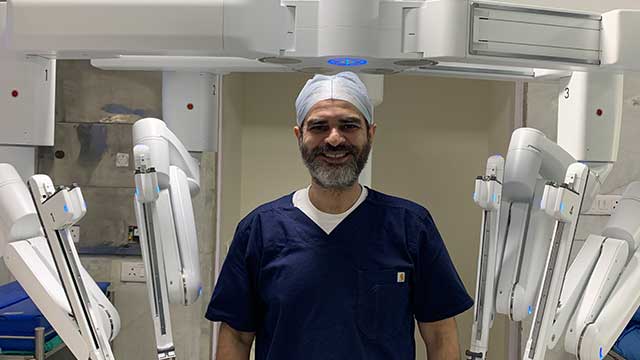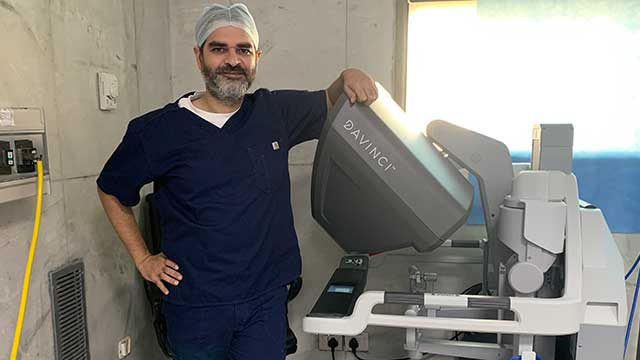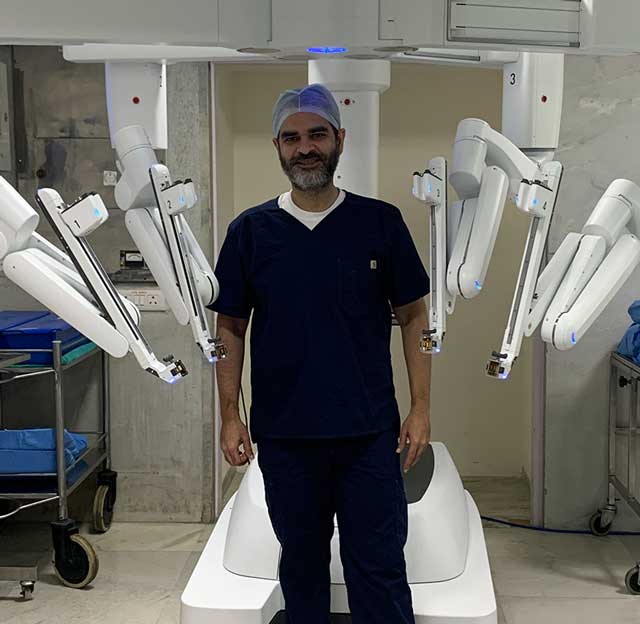Best Robotic Surgeon in Delhi
Getting a cancer diagnosis of any kind is devastating. Fortunately, if it’s prostate cancer, there are several treatment options available. The most effective one is robotic surgery in New Delhi, India, which is also known as robotic radical prostatectomy.
You should get all the facts before you select how you want to treat your cancer. With that in mind, here’s an overview of what to expect with robotic surgery.
The Process of Getting Robotic Surgery for Prostate Cancer
This type of surgery involves removing the entire prostate. Some people are confused by the name “robotic surgery.” A real surgeon is still needed to complete this surgery; it’s not entirely completed by a robot! What’s different is that they are controlling a robot to make the incisions in the patient. This helps with accuracy.
Some patients don’t like the idea of a robot performing the surgery. But it’s important to note that the surgeon is still the one in control. They guide the robot, and the robot cannot act independently.
The surgeon will direct the robot to make four small incisions into your abdomen. These incisions give the surgeon the ability to completely remove the prostate from the patient. After the prostate is removed, the surgeon sends it to histopathology. Once we receive this report, we can find out exactly what stage your cancer is in and what the next course of action should be.
During the surgery, the doctor will give you a catheter to empty your bladder. Typically, you’ll need to keep this catheter in for a week or two after surgery to assist you in the healing process. You should have no problem urinating on your own after you’ve fully recovered from surgery.
What happens inside the Robotic Theater ?
The Benefits of Choosing Robotic Surgery for Prostate Cancer
There are lots of key benefits of this type of surgery. One of the major ones is that it takes less time to recover, and you have a shorter hospital stay. That means you can get back to your regular life much sooner. You’ll also experience less bleeding and less scarring compared to other types of surgery.
This type of surgery is minimally invasive, and it’s pretty uncommon for it to lead to complications. Because the robot assists the surgeon, you have the best chance for accuracy. The organs surrounding your prostate are unlikely to be harmed. Usually, the recovery process is not very painful compared to other surgical procedures.
The most important benefit of this type of surgery is that it’s the most successful type of surgery. There’s a 95% cure rate! Because of the robot’s accuracy and the fact that it completely removes the prostate, you have the best chance of recovery. You also don’t have to deal with the painful side-effects that come with chemotherapy or radiation.
Recovering from Surgery
Surgery can always have side-effects, and robotic surgery is no exception. Some men may deal with urinary incontinence or erectile dysfunction following surgery. In many cases, these are temporary and will eventually subside. However, some men deal with them long-term.
If you end up with incontinence after surgery, it could manifest in several ways. For example, some men deal with minor bladder leaks when they sneeze or exercise. This is known as stress incontinence. Other men could deal with urge incontinence where the need to urinate comes suddenly as a result of the bladder’s increased sensitivity.
Fortunately, there are many treatment options available for both incontinence and ED. It’s important to also note that these side-effects can also occur with many other forms of prostate cancer treatment. Sometimes prostate cancer itself can also cause incontinence or ED.
Although urinary incontinence and erectile dysfunction are the most common side-effects of surgery, there are others that may be more serious. For example, you may experience changes in orgasm. Some men could lose fertility. Thus, if you’re planning on having a child in the future you may want to preserve your sperm before surgery.
There is no one way that a doctor is able to determine how much you’ll be affected by surgery before it actually happens. However, certain risk factors may change your likelihood of experiencing complications. For example, the older you are, the greater your risk of developing some of these problems.
Surgery Follow-Up
Three months after your surgery, we will complete a prostate-specific antigen (PSA) test. This will show us if the surgery alone was enough to cure you of the cancer or if you need additional treatment. If cancer is still present, we’ll usually turn to radiation. It’s easy to complete radiation following surgery. It’s much better to choose surgery first and then radiation as opposed to the other way around.
Get the Highest Chance of Recovery by Choosing the Best Robotic Surgeon in Delhi, India
If you want the most experienced team for robotic surgery in New Delhi, India, you should choose the Blue Ribbon Prostate Clinic. We’ll help you through this difficult, emotional time, and make you feel at ease. We’ll give you the best chance at recovery.
One of the best ways you can ensure a smooth surgery is by choosing a skilled, experienced surgeon who’s worked with many patients. When you choose the Blue Ribbon Prostate Clinic, you’re choosing the facility that’s completed countless successful surgeries for prostate cancer. If you want to find out more about undergoing robotic surgery at our clinic, contact us today.
Frequently Asked Questions About Robotic Surgery in New Delhi, India
Maybe you’re not even at the point of choosing a treatment option yet because you haven’t officially been diagnosed with prostate cancer. Some of the warning signs you should look out for include:
- Blood in your urine or semen
- Changes in urination, such as more frequent urination (especially at night) or more difficulty urinating
- Erectile dysfunction
- Painful ejaculation or urination
- Burning sensation when urinating or ejaculating
- Decrease fluid in ejaculation
- Stiffness or pain in your upper thighs, lower back, pelvis or hips
- Pressure or pain in your rectum
These are symptoms of other health concerns as well. If you’re experiencing one or more of these symptoms, you should go to the doctor. Only an experienced medical professional can officially diagnose you. You’ll get a digital rectal examination (DRE) and a prostate-specific antigen (PSA) test. Whether or not you are experiencing any of these symptoms, you should start regular screenings by the time 50.
Robotic surgery definitely isn’t the only choice for prostate cancer. There are many other treatment options, some surgical and some not, including:
- Radiation therapy
- Transurethral resection of the prostate
- Pelvic lymphonodectomy
- Cryotherapy
- Hormone therapy
- Immunotherapy
- Chemotherapy
The cost of this surgery will vary widely depending on where you get the surgery as well as what type of insurance you have. The good news is that in most cases insurance covers most if not all of the operation. The other good news is robotic surgery costs less than other treatments because it causes minimal blood loss. The stay in the ICU and the hospital in general are also short.
If your cancer has not spread beyond the prostate, you will have the greatest success with robotic surgery. This means you’re in the first stage of prostate cancer. If, on the other hand, your cancer is in the prostate and other organs, this type of surgery may not be helpful.
Ultimately, the only person who can advise you on the best treatment option for your prostate cancer is your doctor. The final decision is yours.
This would change depending on the surgeon and if there are any complications during surgery. However, it will usually take between two and four hours. This is a pretty standard time frame for open surgery. The size of the prostate also plays a role in determining how long the surgery will take.
Getting your prostate removed won’t change much. Your prostate isn’t vital for life. Its primary role is in reproduction, specifically producing your semen. When your prostate is removed, you no longer have the semen that gives sperm energy to fertilize an egg. This can mean you end up dealing with fertility issues after your prostate is removed. This is why it’s a good idea to preserve your sperm before surgery.
Your semen also helps you fight bacteria in your urinary tract. Thus, when the prostate is removed, you may be more susceptible to UTIs.
Every surgery can result in complications. Some of the most common complications include excessive blood loss and blood clots in your arms or lungs. Just like with most surgeries, it’s possible that the surgery could damage your organs or that an infection could occur. Some people also have a bad reaction to anesthesia. Again, the best way to avoid these complications is by choosing the best robotic surgeon in Delhi, India.


